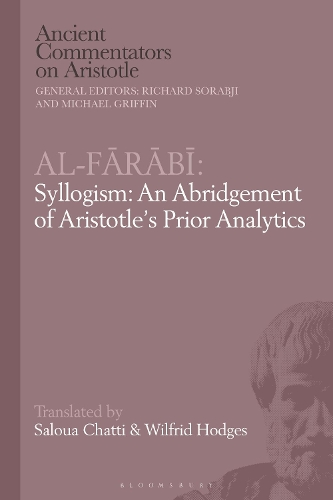
Al-Farabi, Syllogism: An Abridgement of Aristotles Prior Analytics
(Paperback)
Publishing Details
Al-Farabi, Syllogism: An Abridgement of Aristotles Prior Analytics
By (Author) Dr Saloua Chatti
Edited by Dr Wilfrid Hodges
Bloomsbury Publishing PLC
Bloomsbury Academic
21st April 2022
United Kingdom
Classifications
Tertiary Education
Non Fiction
Philosophy: metaphysics and ontology
Philosophy: logic
Philosophy of mind
160
Physical Properties
Paperback
224
Width 154mm, Height 232mm, Spine 14mm
360g
Description
The philosopher Abu Nasr al-Farabi (c. 870-c. 950 CE) is a key Arabic intermediary figure. He knew Aristotle, and in particular Aristotles logic, through Greek Neoplatonist interpretations translated into Arabic via Syriac and possibly Persian. For example, he revised a general description of Aristotles logic by the 6th century Paul the Persian, and further influenced famous later philosophers and theologians writing in Arabic in the 11th to 12th centuries: Avicenna, Al-Ghazali, Avempace and Averroes. Averroes reports on Farabi were subsequently transmitted to the West in Latin translation. This book is an abridgement of Aristotles Prior Analytics, rather than a commentary on successive passages. In it Farabi discusses Aristotles invention, the syllogism, and aims to codify the deductively valid arguments in all disciplines. He describes Aristotles categorical syllogisms in detail; these are syllogisms with premises such as Every A is a B and No A is a B. He adds a discussion of how categorical syllogisms can codify arguments by induction from known examples or by analogy, and also some kinds of theological argument from perceived facts to conclusions lying beyond perception. He also describes post-Aristotelian hypothetical syllogisms, which draw conclusions from premises such as If P then Q and Either P or Q. His treatment of categorical syllogisms is one of the first to recognise logically productive pairs of premises by using conditions of productivity, a device that had appeared in the Greek Philoponus in 6th century Alexandria.
Author Bio
Saloua Chatti is former Professor of Philosophy at the University of Tunis, Tunisia. Wilfrid Hodges is Emeritus Professor of Mathematics at Queen Mary, University of London, UK.
